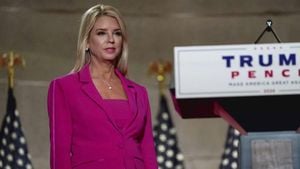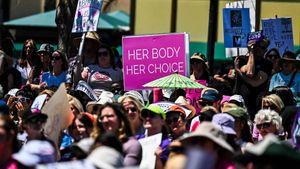New York — The recent legal wrangling surrounding Donald Trump's hush money case has garnered significant attention and debate, illuminating the complex intersection of law and politics. Following Trump’s conviction earlier this year on 34 felony counts related to falsifying business records, his scheduled sentencing on November 26, 2024, has now been indefinitely postponed, creating ripples across the legal and political landscapes.
On November 22, 2024, New York Supreme Court Justice Juan Merchan issued an order formally postponing Trump’s sentencing. This decision emerges against the backdrop of Trump securing the presidency again just weeks prior. The timing has fueled myriad reactions and speculations about the case's future.
Trump's legal team seized upon the nearby presidential inauguration, arguing it renders any sentencing inappropriate. According to the defense filing, "Immediate dismissal of this case is mandated by the federal Constitution, the Presidential Transition Act of 1963, and the interest of justice." They pointed to the constitutional ramifications of prosecuting the president or president-elect, contending it interferes with the orderly transition of executive power.
Steven Cheung, Trump's spokesperson and incoming White House communications director, called the postponement "a decisive win for President Trump" and celebrated it as validation of his electoral victory as he prepares to retake the White House.
Trump's defense is aggressively pursuing motions to dismiss the case entirely. They contend the charges are politically motivated and argue against the Manhattan District Attorney's pursuit of prosecution, stating, "One prosecutor should not have practical power to interfere with the ability of a popularly elected president to carry out his constitutional functions." This claim aims to leverage Trump's recent election as evidence of the misguided nature of the charges against him.
Despite the defense's fervent push, Manhattan District Attorney Alvin Bragg has expressed his intention to contest any motion to dismiss vigorously. He asserts the necessity of maintaining legal accountability, emphasizing, "The People deeply respect the Office of the President, are mindful of the demands and obligations of the presidency, and acknowledge the unprecedented legal questions raised by this case.”
Legal experts remain divided on the plausible outcomes of this protracted legal battle. Some believe Trump's privilege as president-elect may shield him from immediate consequences. They argue this scenario is not just about legalities, but about the broader public sentiment and perception of justice amid Trump's controversial presidency.
Historically, cases involving sitting presidents have faced unique challenges. Following Trump's conviction, discussions around his potential sentences — which range from no jail time to four years — hinge on his status as both president and individual accused of serious crimes.
Much of the discourse surrounding this case references the July 2024 U.S. Supreme Court ruling, which affirmed broad immunity for presidents from prosecution for actions taken during official duties. Trump's defense draws heavily on this precedent, applying it to assert he should face no legal sanction as he resumes presidential duties.
Trump's situation also highlights the intersection of media and public opinion. Many supporters have rallied around him, viewing the legal challenges as politically motivated attempts to undermine him. Social media platforms have erupted with claims of case dismissals, misleading many about the true status of Trump's legal battles.
While Trump's legal team has been granted permission to file motions challenging the conviction by December 2, 2024, the timeline for resolution remains uncertain. The defense argues they need additional time, seeking to submit thorough arguments by the end of the year, which is also strategically positioned before Trump's return to office.
Bragg’s office expresses concern about the precedent set by allowing extensive delays, arguing it disrupts the legal processes established to maintain accountability. The recent suspension of the sentencing is described as both unusual and necessary, considering the unprecedented nature of Trump’s case.
Opposing voices highlight the serious nature of the charges, emphasizing the potential consequences of dismissing them as mere political maneuvering. On the other side of the spectrum, Trump continues to advocate for his acquittal, promoting narratives of victimhood against what he describes as politically charged prosecutions.
Ironically, even as Trump faces legal peril, he also contends with mounting political pressure from rival factions within his own party. The echoes of Trump's past actions and decisions weigh heavily upon his current maneuverings. Legal experts speculate the continual push and pull of case developments may influence upcoming political races, potentially siphoning attention away from more traditional campaign issues.
Meanwhile, other aspects of Trump's post-presidency challenges include two other significant federal cases related to election interference and the mishandling of classified documents. These overlaps create a complicated legal arena for the president-elect as he prepares to once again assume the highest office.
While his supporters remain undeterred, braced for his promised pardon strategies for January 6 defendants, others voiced deep concerns about the ramifications of such actions. Reports of individuals requesting case delays amid hopes of pardons demonstrate the lengths to which some are willing to reach amid uncertain legal challenges.
Only time will reveal how this dynamic situation plays out. Legal and political analysts alike note the potential for appeals, delays, and courtroom confrontations to linger throughout Trump's anticipated term. The backdrop of heightened scrutiny leads to broader questions about justice, accountability, and the nature of political power.
Merchan's hesitance to set new dates for future court proceedings and the defense's urgency to establish their position both contribute to the climate of uncertainty surrounding Trump's legal future. Moving forward, it's clear the outcome of this case will continue to reverberate through both the judicial system and the political fabric of America.
No matter how this plays out, the combination of legal battles, political strategy, and media portrayal will shape America’s perception of power and accountability during one of its most divisive eras. How this tension resolves will be pivotal not just for Trump, but for the broader narrative about governance, justice, and the electorate's trust.



